Introduction
Do Cats Like Ferrets: The intriguing dynamic between cats and ferrets has long been a subject of curiosity among pet enthusiasts. While these two distinct species share our homes as beloved companions, their interactions can range from harmonious coexistence to playful camaraderie, or even the occasional clash of personalities. Understanding whether cats like ferrets friendly, and vice versa, requires a closer look at the unique traits and behaviors of each species, as well as the role of human guardianship in fostering positive relationships between these furry friends. To unravel the nuances of this intriguing relationship, it’s essential to recognize that both cats and ferrets are creatures of instinct, each possessing a distinct set of traits that can influence their interactions.
Cats, for instance, are renowned for their independent and territorial nature. They often exhibit predatory instincts, a strong sense of curiosity, and a need for personal space. On the other hand, ferrets are known for their playful and social disposition. They are highly curious, energetic, and tend to be more sociable with other animals and humans alike. Given these differences, it might seem that the paths of cats and ferrets are destined to cross with conflict. However, the reality is far more complex. The nature of their relationship often depends on various factors, including individual personalities, early socialization, and the environment in which they cohabitate. Some cats and ferrets develop deep bonds, engaging in playful pursuits and even cuddling together, while others may maintain a wary distance, or in rare cases, express outright hostility towards each other.
As responsible pet owners, it is our role to facilitate positive interactions between these animals, ensuring their safety and well-being. This can involve careful introductions, providing separate spaces, and supervising their initial interactions until trust is established. By understanding the unique characteristics of both cats and ferrets and promoting an environment of patience and acceptance, we can encourage the possibility of a harmonious companionship between these intriguing creatures. The dynamics of cat-ferret relationships, exploring the common scenarios, potential challenges, and strategies for fostering a peaceful coexistence between these charming members of our households.
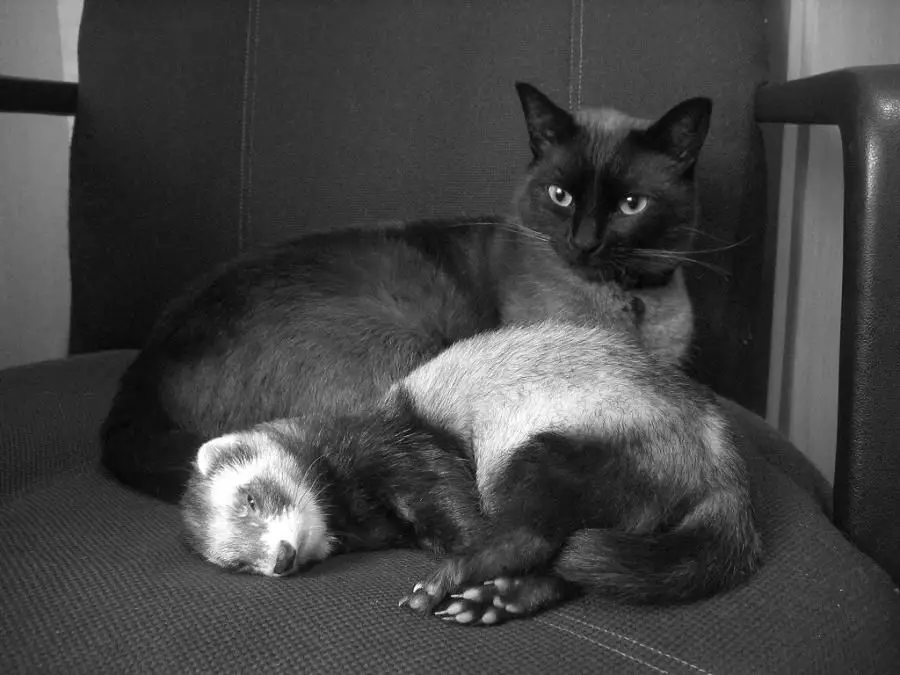
Are ferrets OK with cats?
For the most part, a ferret can get along with one or more cats in your household. However, it’s your job as everyone’s pet parent to make sure your furry friends can play nicely. Here are a few key things to consider: Introductions: First impressions are just as important for a pet as they are for you.
Cats are renowned for their independent and territorial nature. They often exhibit predatory instincts, a strong sense of curiosity, and a need for personal space. A cat’s response to a new animal in its environment can vary widely, ranging from indifference to hostility or curiosity.
Ferrets, on the other hand, are playful, social, and highly curious creatures. They tend to be more sociable with other animals and humans alike. Ferrets are often characterized by their boundless energy and desire for exploration.
Just as people have diverse personalities, so do cats and ferrets. Some cats and ferrets may naturally get along, while others may require more time and effort to build a positive rapport.
The way a ferret and a cat were introduced to each other, particularly during their early developmental stages, can significantly influence their future interactions. Proper socialization is key to fostering a harmonious relationship. As responsible pet owners, we play a vital role in managing their interactions. Supervision and positive reinforcement training can help both species learn to coexist peacefully.
Do cats dislike ferrets?
Ninety-eight percent of the time, ferrets and cats coexist well. Ferrets usually find cats fascinating. Cats commonly treat anything not a cat as unworthy of their attention. But there are always exceptions.
Individual Personalities: Just as people have diverse personalities, so do cats and ferrets. Some cats may naturally get along with ferrets, while others may feel threatened or territorial.
Early Socialization: The way a cat and a ferret are introduced to each other, particularly during their early developmental stages, can significantly impact their future interactions. Proper socialization is crucial to fostering a positive relationship.
Environment: The living space plays a vital role. Ensuring that both cats and ferrets have their own designated areas and resources (like separate food and water dishes, litter boxes, and resting spots) can help reduce competition and territorial disputes.
Human Mediation: Responsible pet owners play a vital role in managing interactions between their cat and ferret. Supervision, training, and positive reinforcement can help both species learn to coexist peacefully.
Do ferrets like cats and dogs?
Ferrets can usually coexist peacefully and even amicably with cats and dogs. However, they shouldn’t be allowed free access to smaller companions such as birds or rodents, as they prey on them in nature.
The prospect of having multiple furry companions in one household is a source of great joy for pet lovers. However, understanding whether ferrets like cats and dogs, and vice versa, is a multifaceted inquiry that hinges on the unique characteristics and behaviors of each species.
Ferrets are playful, social, and highly curious animals. They thrive on interaction and mental stimulation. Unlike some other small mammals, ferrets are often quite sociable and can establish bonds with a variety of creatures, including cats and dogs.
Cats are known for their independence and territorial nature. They tend to have a wide range of personalities, from outgoing and sociable to shy and reserved. Their response to dogs and ferrets can vary based on individual temperament and past experiences.
Dogs, like ferrets, are social animals, and their compatibility with ferrets often depends on their breed and individual temperament. Some dogs have a strong prey drive and may see ferrets as potential playmates, while others may view them as prey.
How do you introduce a cat to a ferret?
Provide your ferret with some titbits in its pen and then bring the cat in the room, with the dish of food. These can be scattered near to the ferret’s pen, but not so close that the ferret becomes anxious. Most ferrets are inquisitive and may venture to the edge of the pen to sniff the cat.
Choose a quiet and neutral space that neither your cat nor ferret has claimed as their territory. A room or a large, enclosed playpen can work well. Remove any potential hazards or escape routes, such as small openings or cords.
Place your cat and ferret in separate enclosures within the designated space. This allows them to see, smell, and get used to each other’s presence without direct contact. Ensure each pet has their essential needs met, such as food, water, and a comfortable resting area.
Swap bedding or blankets between your cat and ferret to help them become familiar with each other’s scents. This will reduce the element of surprise during the face-to-face meeting.
Once both animals seem comfortable with each other’s scent, it’s time for a supervised, controlled face-to-face meeting. Keep both the cat and the ferret on a leash or in a secure, escape-proof harness. Have a friend or family member assist you during the introduction to ensure both pets are safe and secure.
Are ferrets cuddly?
Ferrets may be tiny, but they pack big personalities into small packages. These guys can be extremely loving and cuddly with their humans. Of course, it takes time to form that special friendship.
Ferrets are known for their boundless energy and mischievous antics. They are naturally curious animals, and their playful nature often extends to their interactions with their human caregivers. This playfulness can be incredibly endearing, as they chase after toys, pounce on objects, and engage in games of hide-and-seek.
Ferrets are highly social animals that thrive on interaction with their human companions. They enjoy being a part of the household and often seek out their humans for playtime, exploration, and, yes, cuddling. They form strong bonds with their owners and can become quite attached.
Ferrets often nuzzle their owners with their noses or heads, seeking attention and affection. While not as loud as a cat’s purr, ferrets make a soft, rhythmic sound when content, often during cuddle sessions. Many ferrets enjoy napping close to their owners, often burrowing into blankets or cuddling with them. Ferrets may climb onto their owners’ laps or shoulders, seeking a warm and cozy spot for a nap.
One of the most heartwarming aspects of ferret ownership is the opportunity for cuddle sessions. Ferrets are known to snuggle up to their owners, curling up on laps, chests, or even inside clothing like a warm, furry scarf. These moments of closeness can be incredibly rewarding for both the ferret and the human, fostering a strong bond.
What animal are ferrets afraid of?
Ferrets are fearless.
Ferrets, to their benefit or detriment, are not afraid of anything! This makes them great friends for cats, dogs, and other ferrets. It also makes them dangerously curious – so be sure you ferret-proof your home before playtime!
Dogs: Many ferrets are cautious around dogs, especially larger breeds with strong prey instincts. Ferrets may perceive dogs as potential threats, and their fear can lead to defensive behavior such as hissing, arching their backs, or even biting if they feel cornered.
Birds of Prey: Ferrets may be naturally wary of birds of prey such as hawks and eagles. In the wild, these birds could pose a danger to smaller animals like ferrets, so their instinct may be to hide or seek shelter when they spot one.
Loud Noises: Ferrets have sensitive hearing, and sudden loud noises can startle or frighten them. This includes things like thunderstorms, fireworks, or even loud household appliances. Ferrets may seek refuge or show signs of distress during such events.
Strangers or Unfamiliar Animals: Ferrets are often cautious around unfamiliar animals or humans. They may display signs of fear when encountering new pets or people, such as backing away, puffing up, or vocalizing their discomfort.
Can ferrets get angry?
An unusual loud chirp may occur as a defensive vocalization when a ferret is frightened or very excited. Some ferrets bark when they are angry. It is usually easy to discern a happy, curious ferret vocalization from one indicating anger, fear, or extreme pain.
Hissing and Growling: When a ferret hisses or growls, it’s typically a sign of fear, discomfort, or a desire to be left alone. This is not necessarily anger but rather a way for the ferret to communicate that it feels threatened or wants space.
Biting: Ferrets may bite in response to perceived threats or when they’re in pain. It’s essential to determine the cause of the biting behavior, as it may not necessarily be due to anger but rather a defensive reaction.
Lunging or Pouncing: Ferrets are playful by nature, and they often engage in mock attacks during playtime. They may lunge or pounce on objects, including your hands or feet. This is typically a form of play and not an expression of anger.
Arched Back and Raised Fur: When a ferret arches its back and raises its fur, it’s often a sign of fear or discomfort. It can be mistaken for aggression, but it’s usually a defensive posture meant to make the ferret appear larger and more intimidating to potential threats.
Do ferrets bite hard?
Nibbles and nips are often playful or accidental and usually do not leave a mark on the skin. The deliberate, hard bite, which typically results in a puncture wound, is a much more serious situation. A ferret might bite for many reasons, but most biting behavior falls under one of these two general headings.
Individual Temperament: Ferrets, like people, have diverse personalities. Some ferrets are naturally more gentle and less likely to bite, while others may be more assertive or prone to nipping during play.
Socialization: Ferrets that have been properly socialized from a young age tend to exhibit fewer biting tendencies. Early exposure to various people, animals, and experiences can help them become more comfortable and less likely to resort to biting as a form of defense.
Playful Nature: Ferrets have a playful disposition, and they often engage in rough-and-tumble play with each other and with their human caregivers. During play, they may use their mouths to nip or wrestle gently.
Communication: Ferrets may use biting as a form of communication. When they want attention, to be left alone, or are feeling overwhelmed or frightened, they may use a gentle nip to convey their message.
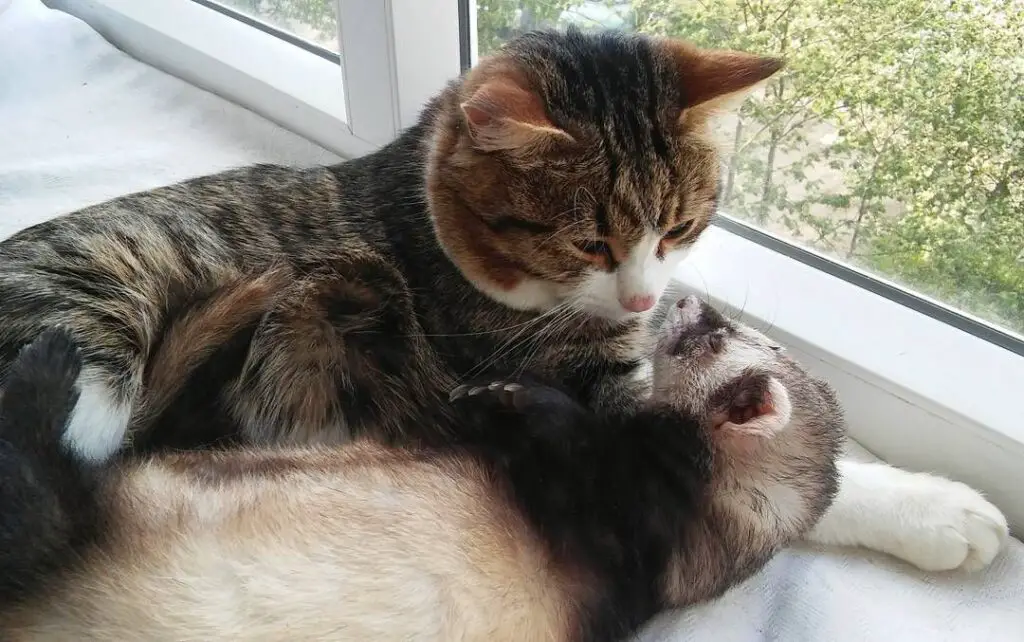
Conclusion
The dynamics between these two species are complex and multifaceted, influenced by a range of factors including their individual personalities, early socialization experiences, and the environment in which they live. While some cats and ferrets form close bonds and share a harmonious coexistence, others may maintain a cautious distance or even exhibit aggression towards one another. As pet owners, it is our responsibility to facilitate positive interactions between cats and ferrets, ensuring the safety and well-being of both animals. Providing separate spaces when necessary, and supervising their interactions until trust is established.
Can vary greatly from one pairing to another. An environment that promotes understanding and tolerance between these two unique species. By doing so, we can increase the chances of our feline and ferrets along friends forming rewarding and peaceful relationships, enriching our lives and theirs in the process. A cat-ferret relationship often hinges on our ability to manage and mediate their interactions. Each animal has its own set of instincts and behaviors, and it’s not uncommon for them to misunderstand or misinterpret each other’s signals. Patience, consistent training, and supervision are key factors in promoting a positive coexistence.
An environment where both cats and ferrets feel safe, secure, and enriched is vital. Providing plenty of mental and physical stimulation, along with individual attention, can help alleviate potential conflicts born out of boredom or competition. While there’s no definitive answer to whether cats like ferrets, it’s clear that with the right approach, these two distinct species can peacefully coexist and even form strong bonds. By recognizing their unique qualities and taking steps to facilitate positive interactions, we can create a harmonious household where cats and ferrets enrich each other’s lives, and in doing so, bring joy and fulfillment to our own.

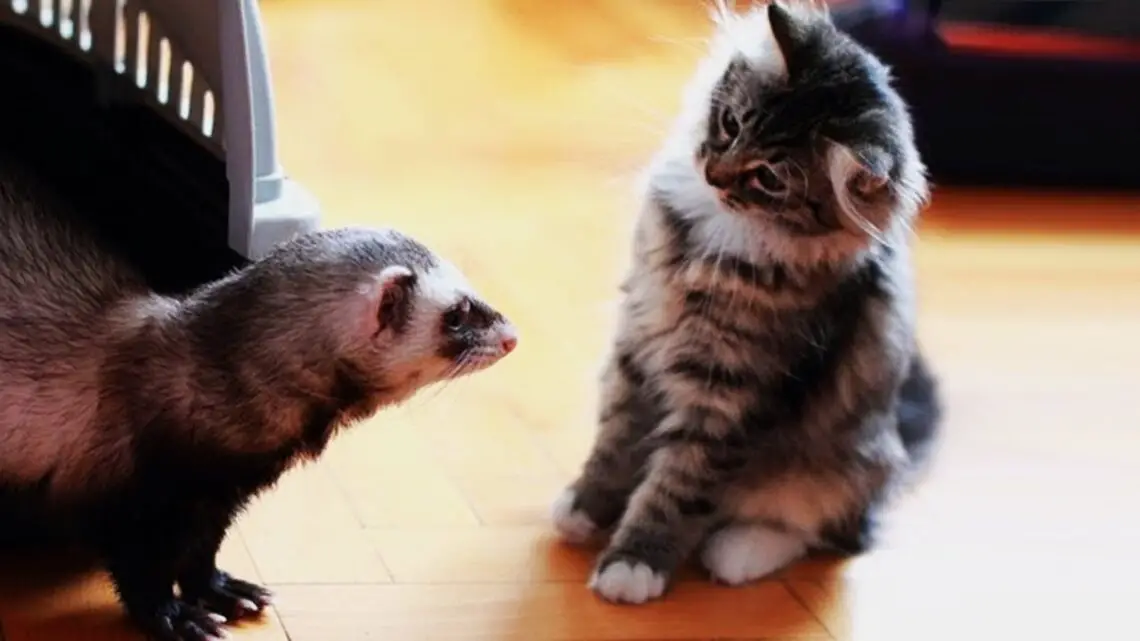
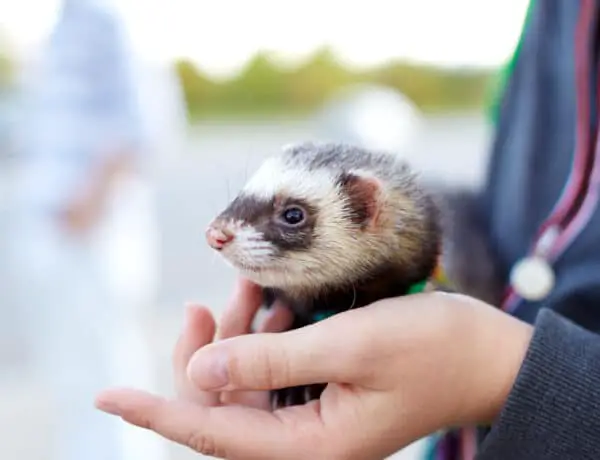
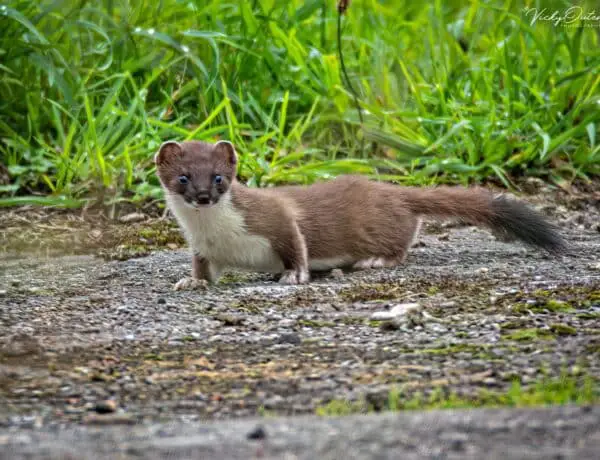
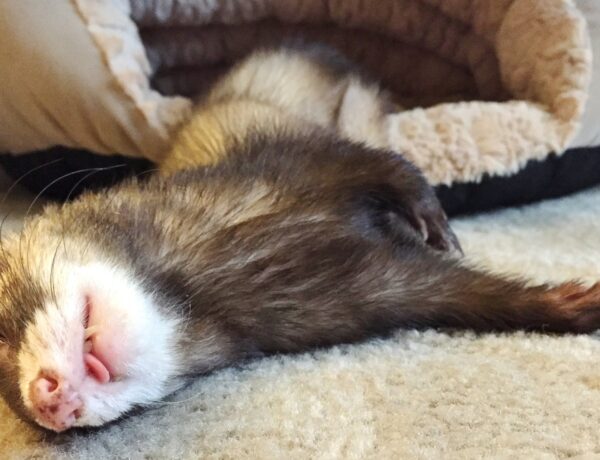
No Comments